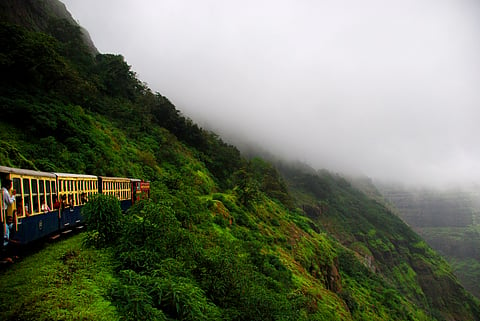
- Destinations
- Experiences
- Stay
- What's new
- Editor’s Picks
- Responsible Tourism
- CampaignsCampaigns
- Subscribe

The monsoon season is upon us, bringing a sense of rejuvenation and adventure. It's the perfect time to create your ultimate monsoon bucket list and make the most of this weather. Whether you're a nature enthusiast, an adrenaline junkie, or simply looking for a unique experience, there are plenty of activities to indulge in during the rainy season. Get ready to embrace the rain and create unforgettable memories in the lap of nature.
Witness An Ancient Boat Race
The rivers and backwaters of Kerala enrich the region's culture in various ways. One of how it manifests is the Vallam Kali, the traditional boat race of Kerala. Vallam Kali even has its own form of poetry song called Vanchipattu (boat song), sung by oarsmen while rowing and even during some rituals that precede a race. As the traditional boats speed through the canals and backwaters of Kerala, spectators cheer wildly. The pouring rain can't dampen their enthusiasm some even jump into the water excitedly. For more information on Kerala's spectacular boat races, check here.
Take In The Magnificence Of The Ghats
Located in the Western Ghats, around 800 m above sea level, misty Matheran is a delight during the monsoon. The hill station in Maharashtra has lakes and waterfalls that come to life during the monsoon. Bring good walking shoes as motor vehicles are prohibited here- they must be parked nearby Dasturi Naka. As the name suggests, there is indeed only one tree at the windy One Tree-Hill Point &mdash a truly scenic spot to see the panorama of the Ghats, especially just after the monsoon. Another must on every visitor's itinerary is Charlotte Lake, fringed by the forest and with Pisharnath Temple at one end. You can take the Matheran Heritage Hill Railway to get there.
Get Up Close With Flowers
The Valley of Flowers in the Garhwal Himalayas of Uttarakhand is the best place to see a profusion of colourful flowers that only bloom briefly during the monsoon. The colour scheme changes almost weekly as one set of species gives way to another. Then there's the Kaas Plateau, also known as Maharashtra's "valley of flowers", located roughly 300 kilometres by car from Mumbai. The otherwise barren plateau takes on a coat of green near the end of the monsoon season (typically from September to early October). Beds of yellow, pink, white, and blue flowers extend as far as the eye can see. It was added to the UNESCO World Heritage List as a biodiversity hotspot in 2012. Remember to carry protective gear for your camera.
Sign Up For An Ayurveda Detox
It's that time of the year when we remind you that Ayurveda works best in the monsoon&mdashmost toxins accumulate in the summer months. The cleansing spell of rain brings relief, washing the air clean and unclogging moistened pores. There are various reasons for this, including that our skin pores open up faster during the monsoon, allowing us to better absorb Ayurvedic oils. Furthermore, the release of toxins is more intense because the body naturally perspires more in humid conditions. Ayurvedic doctors also believe that the monsoon months, with their mix of dry and sunny times and warm showers, benefit rheumatism, arthritis, and skin problems. So go ahead and embrace the magic of the monsoon's revitalising powers at an Ayurvedic retreat in India.
Do A Waterfall Trek
Apart from beaches and the sea, Goa is also home to the majestic Dudhsagar Waterfalls. It turns into its spectacular best during the monsoon. This is when you realise why this waterfall, about 80km away from Panaji, is named thus the tonnes of water coming down the hillside look like pouring milk. Ensconced in the Western Ghats, Goa's highest and largest waterfalls come down at an impressive length of 306m. Train passengers get a good view of the cascade, thanks to the rail track from Londa, which snakes down south and passes by the falls before heading northwest in a wide curve to Collem. The way to the falls can only be accessed by trekking on the railway tracks, which take you through freshwater streams in the jungle.
Follow The Stepwell Trail
Rajasthan's monsoon season relieves the scorching heat and adds beauty to the landscape. Go across Rajasthan following the many stepwells (subterranean wells which a flight of stairs can approach). Also known as bawri, baoli or vav, these ancient resourceful water harvesting systems were often beautified with elaborate carvings. Check out Toorji Ka Jhalra from Jodhpur. Constructed in 1740 by the queen of Maharaja Abhay Singh, this stepwell is more than 200 feet deep and is constructed in red sandstone. It features carved dancing elephants, lions, and other deities. And the stunning Chand Baori in Abhaneri village. Constructed by King Chanda of the Nikumbh dynasty, this stepwell was constructed around the 8th and 9th centuries. The stepwell features 3,500 steps with 13 floors and is considered one of the largest stepwells in the world.
